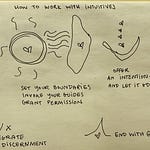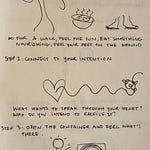I recently facilitated a workshop on how to work with your sleeping dreams in waking life, which is a passion of mine that inspired a recipe (beef stew) and a podcast (a 9-minute listen). Listening to your dreams can be a deep act of self-compassion: You are taking yourself seriously and acknowledging you have something important to say. It can also be extremely useful in a practical way when your dreams offer insights about what’s happening in your waking life.
As part of a yoga retreat in Nayarit, Mexico, my co-facilitator, Reva Cotter, and I gathered 11 women poolside at sunset. Reva and I had been “dream buddies” for the past year, exchanging audio messages about our dreams, and we had really bonded over the practice. We were excited to share what we had learned with the women at the retreat. Here’s what I shared.
The Basics: Tactics for working with your dreams
Gather your materials: Sleep with a notebook next to your bed with a pen marking the next blank page.
Ask for a dream: I imagine part of my subconscious as a “dreamweaver,” and before I fall asleep, I might ask for a dream or ask a question that might be answered in a dream. Reva thanks her Dream Guides. You can use any approach that feels right for you.
Record what you remember: As soon as you wake up, even before your eyes are fully open, write down as much as you can remember about your dreams, even if it’s just one word or a feeling. Use the present tense (“I walk into the room…”) and as much descriptive detail as you can, even for minor things (“the shape of the pizza box is triangular, only big enough for one slice”). If there’s an image that sticks with you, draw it.
Underline the nouns: You don’t need to do this right away (or at all), but if you want to play with decoding the dream, one approach I use from Clarissa Pinkola Estés is to go back later and underline the nouns and write down quick, personal associations with each noun. I retell the dream with those associations, paying attention to the feeling and overall message of the dream. I give the dream a title, as if it were a movie or a short story, which also helps me remember it later.
Imagine new endings: Dreamworker Robert Moss encourages dreamers to go back and explore their dreams in their imagination. Are there questions you want to answer? A different action or outcome you want? Especially if I’ve had a disturbing dream and I’m up in the middle of the night, I will think about the dream and imagine a different ending, which can feel like healing or closure.
Three dreams that inspired action in my life
I don’t always remember my dreams, but sometimes they are so vivid and clear, they need no interpretation at all. These dreams have a different texture than typical dreams, and I know they are conveying information that’s important for action and decisions in my waking life. Here are three examples of those dreams.
“The Toxic Bubble Gum”
This was the dream that prompted me to quit my job at Facebook (now Meta), a decision I had been contemplating for two years before I actually did it. In the dream, my former Product VP partner and I are in a conference room. We are breathing the same air. His eyes are glowing a toxic neon yellow, and he’s blowing bubbles out of gum that’s the same color. I knew when I woke up it was time to go, and I did.
“The Yellow Shirt”
This dream catalyzed me to end a friendship. In the dream, the friend and I have fallen asleep on a couch. We are both wearing yellow shirts. When my dream self wakes up, I sit up, and I can’t tell where my shirt ends and my friend’s shirt begins. The feeling was a total dissolution of boundaries that felt very unhealthy. When I woke up, I wrote down what I wanted to communicate to my friend, and I did.
“The Frozen Chicken Dream”
This was a recurring dream that at first felt anxious and then joyful, which showed me how I’d grown. In the dream, I am in a large rental house on vacation with a group of people, usually my family, sometimes friends. We are all having a good time, enjoying snacks I set out. But then, I realize that it’s 7pm and I haven’t yet started cooking dinner, and in fact, the chicken I had planned to cook is still in the freezer. This is a nightmare: What will I feed everyone? After repeating this dream several times over a few months, in the final version of the dream, the ending changed. When I realize the chicken is still frozen, I ask my mother and sister for help, and we all come to the kitchen and figure things out together. It’s a happy ending, no longer a nightmare, reflecting back to me how changing my approach to collaboration and asking for help in different aspects of my life and is leading to more harmonious outcomes (and more fun parties).
Reva and I are continuing to develop our workshop as a self-paced online offering. If you’re interested in participating or learning more, please get in touch.














Share this post